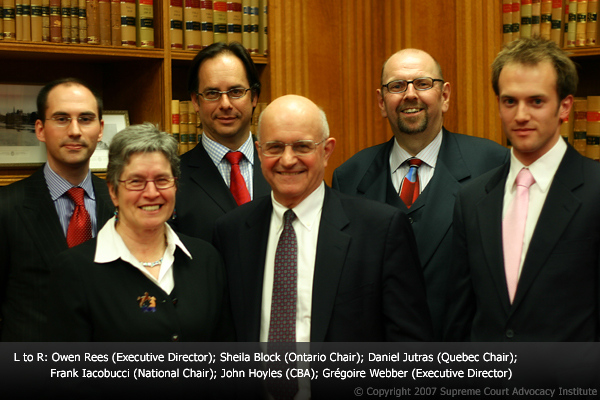Just over two years ago, Grégoire Webber, Owen Rees and former Supreme Court Justice Frank Iacobucci, LLD’03, launched the Supreme Court Advocacy Institute to provide free, non-partisan advocacy advice to lawyers appearing in an appeal before the Supreme Court of Canada. Co-executive director Grégoire Webber spoke to inFocus reporter Laurel Baker about the initiative.

LB: What is the Supreme Court Advocacy Institute?
GW: In a sentence, we invite all counsel appearing before the Supreme Court of Canada to a free, non-partisan advocacy session before a panel of three seasoned advocates sitting as mock judges.
LB: Why did you help to found the SCAI? Where did the idea come from?
GW: Owen Rees, BA’99, and I were clerking at the Supreme Court of Canada in the 2003-2004 year, for Justice LeBel and Justice Binnie, respectively. We came across a program administered at the Georgetown University Law Centre, which offered all counsel appearing before the Supreme Court of the United States a free advocacy session in advance of oral argument.
We felt that a similar program could benefit both first-time counsel who may not appreciate some of the unique challenges of arguing before the final court of appeal and seasoned counsel who might welcome the opportunity to test their arguments before senior colleagues.
Upon learning of the Honourable Frank Iacobucci’s retirement (in 2004) from the Supreme Court, we approached him with our idea and invited him to become its first national chairperson. He enthusiastically welcomed the invitation. We relied heavily on his advice as we sought to shape and establish the Institute over the following two years.
LB: What would you say are the Institute’s greatest accomplishments to date?
GW: Since its founding in 2006, the Institute has developed to a truly national program, offering free advocacy sessions for counsel in British Columbia, Alberta, Ontario, Quebec, and the Atlantic provinces. Each one of those regions has a committee that recommends a pool of mock judges from the local talent. For the other regions, the Institute offers sessions to any counsel requesting one.
We are pleased to report that in over 20% of cases argued before the Supreme Court of Canada, counsel for the appellant, respondent, or both will have benefited from an advocacy session with the Institute prior to appearing before the Court.
The Institute is available to all counsel without cost thanks to the willingness of all members of the Bar to donate their time on a pro bono basis.
LB: Please describe a moment where you felt like the Institute was really doing good work… Or a few moments, if you like!
GW: After each advocacy session organized by the Institute, we communicate with the panel of mock judges and with counsel and ask them how their experience with the Institute was and how we might improve our programs. Without exception, the testimonials of counsel speak to the seriousness with which the mock judges prepared themselves and how they were better as counsel before the Supreme Court because of their experience with the Institute. The mock judges also speak to how much fun they had engaging on different issues of national importance.
LB: Why does the institute emphasize its non-partisan nature?
GW: One of the justifications for the Institute is to allow the Supreme Court to hear the best possible oral advocacy to inform its consideration of the legal issues raised by an appeal. It would be inconsistent with that undertaking to screen counsel based on the legal position they wish to put forward.
The Institute is a non-political, neutral, and independent organization. Our founding purpose is to increase the quality and effectiveness of oral advocacy before the country’s highest court. Correspondingly, the role of an advocacy session with the Institute is to allow counsel to become familiar with the procedures for oral advocacy before the Court, the nature of the hour counsel will have to argue, and the sorts of questions counsel may expect from the bench. The mock judges will provide critique and advice on how counsel might improve the delivery and framing of the argument, but the Institute’s role is not to make the argument for counsel.
LB: How do you hope the SCAI will contribute to your profession?
GW: I remember my time at the Faculty of Law at McGill as one which emphasized the relationship between one’s legal education and one’s commitment to public service. My colleagues and I were encouraged to see ourselves as students of more than the law narrowly conceived, but of our city, province, country, and beyond. As our then Dean expressed during our graduating ceremony, McGill taught us more than a savoir faire, but also a savoir être.
Of course, McGill is not the only legal institution in Canada which encourages this conception of the role of the lawyer. As all of the Institute’s many participants illustrate by donating their time, lawyers in Canada share McGill’s understanding of public service as a calling.
For additional information and for a feel of the Institute’s activities, visit scai-ipcs.ca
